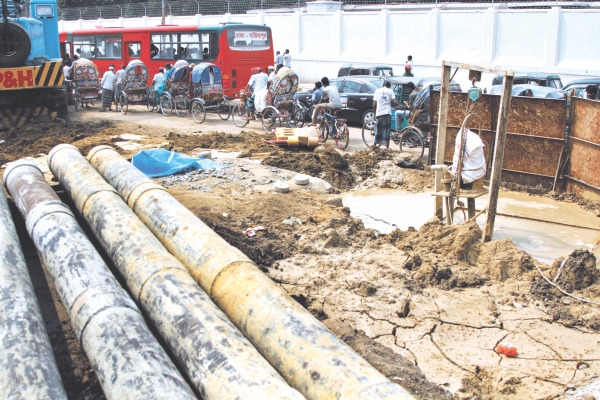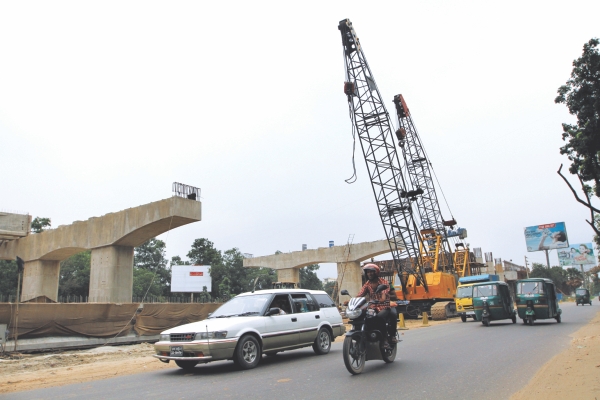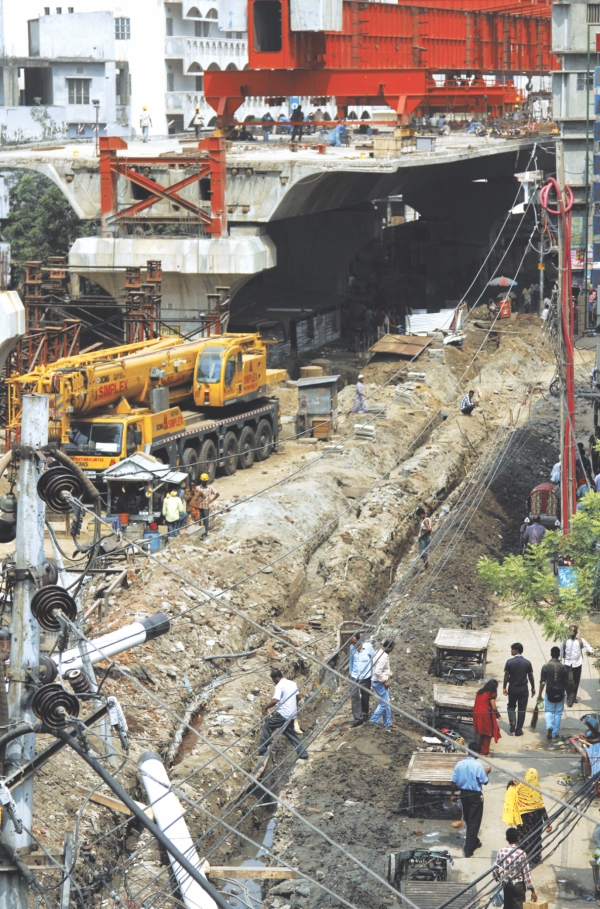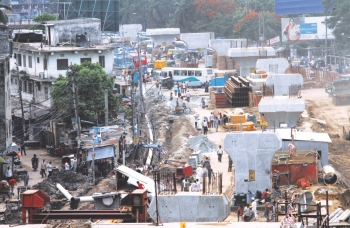| Home - Back Issues - The Team - Contact Us |
 |
| Volume 11 |Issue 25| June 22, 2012 | |
|
|
Cover Story
Road digging during the monsoon has almost become a ritual in the last few years. The utility agencies' inability to stick to the deadlines, due to a combination of bureaucratic decisions and a mysteriously slow-paced work schedule, has proved to be a hindrance to the public. Naimul Karim A glance at the streets of the capital, in the last few weeks, would suggest that the city was perhaps hosting a massive gold-mining expedition. In reality of course it was only following the age-old trend of trudging through a number of road-digging projects illogically, right before the monsoon arrived. Most of these projects should have been completed before the rainy season but a look at the city's main thoroughfares show that many of them remain unfinished. The dug up roads, apart from intensifying the already impossible traffic jams, also create tremendous misery and hazards for the public. Projects, such as the ones conducted by the Dhaka Water Supply and Sewage Authority (WASA), dug up 26 KMS of road, in Gulshan, Mirpur and Dhanmondi, in the last two months. While these ventures are a must for the development of the city, their timing is definitely off and the way they have been carried out was quite inconsiderate and painful for the city's dwellers.
"I had to change my entire routine, for two weeks, due to the digging at Mirpur Road last month. What usually takes 45 minutes, took me two hours to cross," says Mehjabeen Orchi, who travels by the Mirpur Road, near Asad Gate, to go to work everyday. "I couldn't go to work by car for a week because of the huge pipes placed on the roadside. We weren't even informed about this," says Manzural Jami, a resident of Gulshan, referring to the cylindrical tubes used by WASA. WASA had embarked upon fixing the storm water drainage system in certain roads in Gulshan. The cylindrical sewerage pipes used by the utility agency were kept at the sides of the main roads, causing excruciating delays for the ongoing vehicles. "The digging and piling of mud and sand on the streets has been a menace. Frequent rains have made it quite impossible to carry out the activities the authorities have opted for. It's strange that they don't have minimum consideration to public sufferings," exclaims Anisuzzaman Sarkar, a resident from Gulshan.
A project, setting up electric cables at Shyamoli, has badly affected the region as well. The project narrowed down the main road, thereby, worsening the traffic situation. Several people in the region have complained of suffering from respiratory complications and bronchial asthma due to the digging. "The traffic jams along with the dust from the sites at Shyamoli make my journey to college extremely painful," says Jaharul Islam, a second-year engineering student. The area near Square Hospitals, near Panthapath, has been another zone where people suffered due to such projects. The Syedabad water treatment project, conducted by WASA, almost blocked half the road, creating a chaotic situation. "With the construction of the flyovers, travelling in Dhaka is time-consuming as it is, on top of that, if the officials cut so many roads, then how do they expect us to move?" exclaims Motiur Rahman, a resident of Dhanmondi. "The buses here can't stay for more than a minute since half the road is under construction," says Abdul Matin, a bus-ticket seller at Panthapath." The monsoon has already begun and it's going to make things a lot worse. I really don't know when the digging will stop," adds a desperate Matin. "There have been instances in the last few weeks when our ambulances got stuck in the jam created due to the road-work," adds a guard working for Square Hospitals.
Exasperated due to the dire conditions in the different parts of the city, residents blamed the city corporation for conducting several road-digging projects at the same time. Explaining the reason behind the simultaneous projects, Zahangir Alam, Chief Engineer, Dhaka City Corporation says, "A number of projects are often linked and if they don't take place together, there can be bends in the pipeline, which can cause serious problems later on," he says. When asked as to why certain projects exceeded the deadline, Alam replies," We provided the permissions for these projects earlier this year, however, it's unfortunate that the deadline wasn't met. Maybe if WASA had started their work a month earlier, things would have been different.” The Managing Director of WASA, Taqsem Ahmed, however, stated that it wouldn't have made any difference had they started their work earlier.
"It would have been nice if the DCC had given us permission to work throughout the year, but we are allowed to work only from November onwards. We start the smaller projects in November. The bigger ones however, need funding and need to be finished at one stretch. We also need to take permission from various officials before starting the project. So there are a number of factors involved," says Ahmed. He further says that all the WASA projects, apart from the one in Panthapath, were over by the 30th of April. Apart from the Syedabad project, WASA worked on the storm water drainage system in Dhanmondi and Mirpur. Urban experts are of the opinion that the lack of proper planning within the ministry is one of the major reasons behind the frequent delays in such projects. "The different departments need to work together and coordinate with each other. Currently, different utility agencies are digging roads for their own purposes, at their own will. At the end of the day the public suffers the most," says Syed Shahriar Amin, member of the executive board, Bangladesh Institute of Planners.
Echoing Amin's sentiments, Professor Sarwar Jahan, Department of Urban and Regional Planning, BUET, says," These kinds of projects will continue to take place, since Dhaka didn't grow in a planned manner. When there isn't a long-term plan, you'll have to depend on sudden changes like these diggings, every year, in order to develop the city.” The Carpeting Conundrum! "Before a road is cut, we pay the DCC the amount of money required to fix the road. The cost is estimated based on accurate sketches and it's usually a huge amount. Only after that are we given the permission to do our work," explains Tasqem Ahmed.
"Once our job's done, we fill the roads. After that the DCC can carpet the area within 15 to 20 days. They should have started carpeting the regions by now…" he adds. The DCC however, plans to start rebuilding the roads after August. Until then, vehicles will have to deal with the make-shift roads built on the tracks. Urban experts claim that the temporary roads built by WASA and other utility agencies will not be able to survive the monsoons. "A water-logged area is bound to get spoilt. It's going to get muddy due to the rains and may cause more problems for vehicles as well," says Amin. Sharing Amin's views, Taqsem Ahmed says, "If the roads are not carpeted, then they'll obviously be affected by the rain. You cannot expect a kaccha road to have the same sustainability as that of a smooth road.” Instances from the past indicate that the City Corporation has often neglected its role when it comes to the repairing roads. The main road from Kadamtala to Rajarbag, in the capital, is one such example. The 16 by 20 feet wide road has been severely damaged due to the increasing population in these areas. Residents claim that they had written to the DCC, asking them to re-carpet the road. The city corporation, however, according to the residents, ignored their request. "The main road today is in a far worse condition. Now the road needs a lot more than just carpeting and will be more expensive for the DCC to fix," says Md Ashraf Hossain, a resident of Kadamtala.
It took the DCC almost a year to fix certain roads in sectors 4, 5 and 6 in Uttara. The roads which were dug by WASA, last year, to upgrade the storm water drainage system, were repaired recently.
"There is hardly any commitment from the city corporations. If every decision requires the approval of so many officials, then the work is bound to get delayed. This system needs to change," says Sarwar Jahan. The ongoing crisis is bound to continue as long as the city corporation and the utility agencies take decisions based on their individual interests. As Jahan, Amin and several other urban experts have repeatedly said, a mega-city like Dhaka needs to focus on long term development goals. The inability to complete the road-related projects within the deadline is just the beginning of a series of problems. The DCC's laidback attitude has ensured that the temporary roads during the monsoon continue to make life difficult for the city dwellers. "With all the dust and fumes in the city, I think all the conductors are going to die first!" jokes a bus conductor from Mirpur. But his statement perhaps best represents the current situation in the capital.
|
||||||
Copyright
(R) thedailystar.net 2012 |








